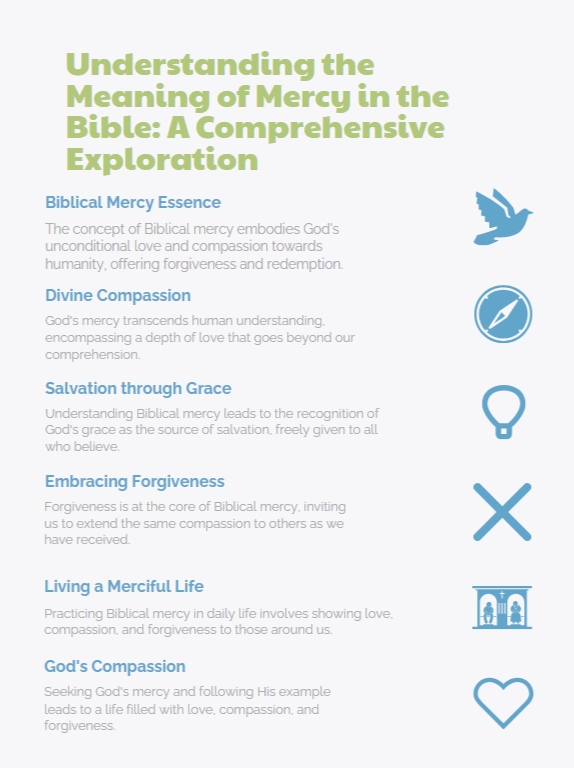The concept of mercy is a cornerstone of biblical teaching, appearing throughout both the Old and New Testaments. It’s a profound and multifaceted idea that reflects God’s character and serves as a model for human behavior. In this comprehensive exploration, we’ll delve deep into the meaning of mercy in the Bible, examining its various aspects, manifestations, and implications for believers and non-believers alike.
Mercy, in its biblical context, goes beyond simple forgiveness or leniency. It encompasses a rich tapestry of divine love, compassion, and grace that has shaped theological understanding and religious practice for millennia. By understanding mercy, we gain insight into the nature of God and the expectations placed upon those who follow His teachings.
1. The Hebrew and Greek Roots of Mercy
To fully grasp the biblical concept of mercy, it’s essential to examine its linguistic roots in the original Hebrew and Greek texts:
Hebrew Terms for Mercy
- Chesed (חֶסֶד): Often translated as “loving-kindness” or “steadfast love,” this term represents God’s covenant faithfulness and enduring mercy.
- Rachamim (רַחֲמִים): Derived from the word for “womb,” this term conveys a deep, compassionate love, similar to a mother’s love for her child.
- Chanan (חָנַן): This verb means “to be gracious” or “to show favor,” often used in pleas for God’s mercy.
Greek Terms for Mercy
- Eleos (ἔλεος): The primary Greek word for mercy in the New Testament, encompassing compassion and acts of kindness.
- Oiktirmos (οἰκτιρμός): Often translated as “compassion” or “pity,” this term emphasizes the emotional aspect of mercy.
- Splanchnizomai (σπλαγχνίζομαι): A verb meaning “to be moved with compassion,” often used to describe Jesus’ reactions to human suffering.
Understanding these linguistic nuances helps us appreciate the rich, multifaceted nature of mercy as presented in the Bible.
2. Mercy in the Old Testament
The Old Testament lays the foundation for understanding God’s mercy, often portraying it in tension with His justice:
Key Aspects of Old Testament Mercy
- Covenant Faithfulness: God’s mercy is often linked to His covenant promises, demonstrating His unwavering commitment to His people despite their failings.
- Forgiveness of Sins: Numerous passages describe God’s willingness to forgive sins when people repent and seek His mercy.
- Compassion for the Vulnerable: The law frequently commands mercy towards the poor, widows, orphans, and strangers.
- Deliverance from Enemies: God’s mercy is often manifested through protecting and delivering Israel from its foes.
Notable Old Testament Passages on Mercy
- Exodus 34:6-7: “The Lord, the Lord, a God merciful and gracious, slow to anger, and abounding in steadfast love and faithfulness…”
- Psalm 103:8: “The Lord is merciful and gracious, slow to anger and abounding in steadfast love.”
- Lamentations 3:22-23: “The steadfast love of the Lord never ceases; his mercies never come to an end; they are new every morning; great is your faithfulness.”
These passages highlight the centrality of mercy to God’s character in the Old Testament narrative.
3. Mercy in the New Testament
The New Testament builds upon the Old Testament foundation, with Jesus Christ embodying and expanding the concept of divine mercy:
Key Aspects of New Testament Mercy
- Incarnation: God’s ultimate act of mercy is seen in sending His Son to live among humanity.
- Sacrificial Love: Christ’s death on the cross is presented as the supreme demonstration of God’s mercy towards sinful humanity.
- Forgiveness and Reconciliation: The New Testament emphasizes God’s mercy in offering forgiveness and reconciliation through faith in Christ.
- Empowerment for Merciful Living: Believers are called and empowered to show mercy to others as a reflection of God’s mercy towards them.
Notable New Testament Passages on Mercy
- Luke 6:36: “Be merciful, just as your Father is merciful.”
- Ephesians 2:4-5: “But God, being rich in mercy, because of the great love with which he loved us, even when we were dead in our trespasses, made us alive together with Christ…”
- James 2:13: “For judgment is without mercy to one who has shown no mercy. Mercy triumphs over judgment.”
These passages illustrate how mercy is central to the gospel message and Christian living.
4. The Relationship Between Mercy and Justice
One of the most profound aspects of biblical mercy is its relationship to justice. Far from being opposites, mercy and justice are intertwined in God’s character and actions:
Key Points on Mercy and Justice
- Balancing Act: God’s mercy doesn’t negate His justice but rather fulfills it in unexpected ways.
- Redemptive Purpose: Biblical mercy often serves a redemptive purpose, aiming to restore rather than simply excuse.
- Mercy in Judgment: Even in acts of judgment, elements of God’s mercy can often be discerned.
- Human Responsibility: While receiving God’s mercy, humans are called to exercise both mercy and justice in their dealings with others.
5. Mercy in Practice: Biblical Examples
The Bible is replete with examples of mercy in action, both divine and human:
Divine Mercy
- Noah and the Flood: God provides a way of salvation for Noah and his family.
- Exodus: God delivers the Israelites from slavery in Egypt.
- David’s Repentance: God forgives David after his sin with Bathsheba.
- Jonah and Nineveh: God spares Nineveh when they repent.
- Prodigal Son: Jesus’ parable illustrates God’s merciful love for repentant sinners.
Human Mercy
- Joseph Forgiving His Brothers: Despite their betrayal, Joseph shows mercy to his brothers.
- David Sparing Saul: David refuses to harm Saul, showing mercy to his persecutor.
- Good Samaritan: Jesus’ parable exemplifies mercy towards strangers.
- Stephen’s Forgiveness: Stephen forgives those stoning him, echoing Christ’s mercy on the cross.
6. The Implications of Biblical Mercy
Understanding biblical mercy has profound implications for theology, ethics, and personal spirituality:
Theological Implications
- God’s Nature: Mercy reveals God’s love, compassion, and desire for reconciliation.
- Salvation: The doctrine of salvation is grounded in God’s merciful initiative.
- Eschatology: Mercy informs our understanding of final judgment and eternity.
Ethical Implications
- Forgiveness: Believers are called to forgive others as they have been forgiven.
- Compassion: Mercy motivates compassionate action towards those in need.
- Justice: Understanding mercy enhances our pursuit of true justice.
Personal Spiritual Implications
- Gratitude: Recognizing God’s mercy fosters deep gratitude and worship.
- Humility: Receiving mercy cultivates humility and dependence on God.
- Transformation: Experiencing God’s mercy can lead to profound personal transformation.
7. Mercy in Different Christian Traditions
While all Christian traditions emphasize mercy, they may differ in their interpretations and applications:
| Tradition | Emphasis on Mercy | Key Practices |
|---|---|---|
| Roman Catholic | Sacramental, works of mercy | Confession, indulgences, acts of charity |
| Eastern Orthodox | Divine-human synergy in mercy | Theosis, almsgiving, prayer for mercy |
| Protestant | Grace-based understanding of mercy | Personal repentance, faith-inspired good works |
| Anabaptist | Radical mercy and nonviolence | Forgiveness of enemies, community-based care |
8. Challenges in Understanding and Applying Mercy
Despite its centrality, the concept of mercy presents several challenges:
- Balancing Mercy and Justice: How to uphold both in personal and societal contexts.
- Avoiding Cheap Grace: Ensuring mercy doesn’t lead to permissiveness towards sin.
- Extending Mercy to Enemies: The difficult call to show mercy even to those who harm us.
- Mercy in a Broken World: Applying mercy in situations of systemic injustice and suffering.
Conclusion, The Transformative Power of Biblical Mercy
In conclusion, the meaning of mercy in the Bible is far-reaching and profound. It reveals the heart of God, shapes the message of salvation, and provides a model for human behavior. Biblical mercy is not a weak or passive concept, but a powerful force that can transform individuals, relationships, and societies.
As we grapple with the complexities of mercy – its relationship to justice, its practical applications, and its challenges – we are invited into a deeper understanding of God’s character and our calling as His people. The biblical vision of mercy offers hope, healing, and a path to reconciliation in a world often marked by judgment, division, and retribution.
Ultimately, the meaning of mercy in the Bible points us towards a radical love that has the power to overcome evil with good, to forgive the unforgivable, and to bring light into the darkest corners of human experience. It challenges us to grow in our capacity to receive and extend mercy, reflecting the divine image in which we are created and participating in God’s redemptive work in the world.







